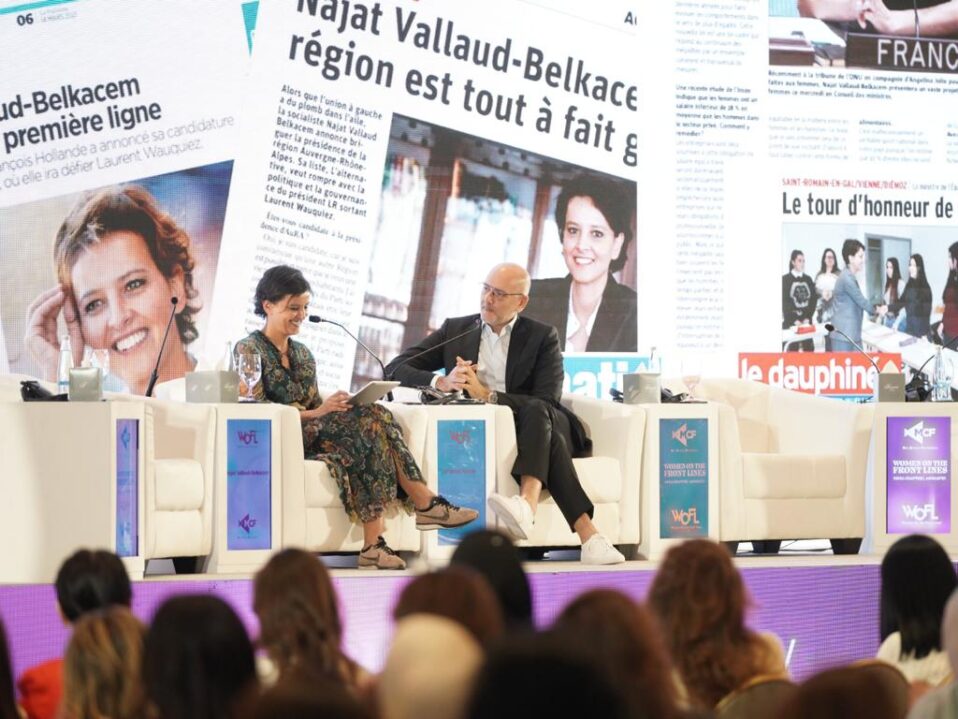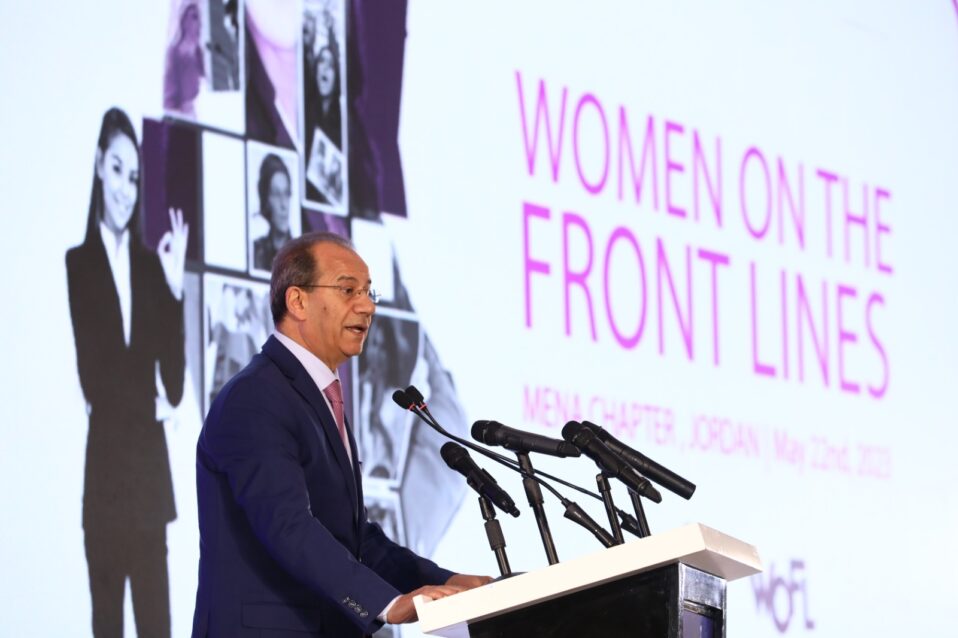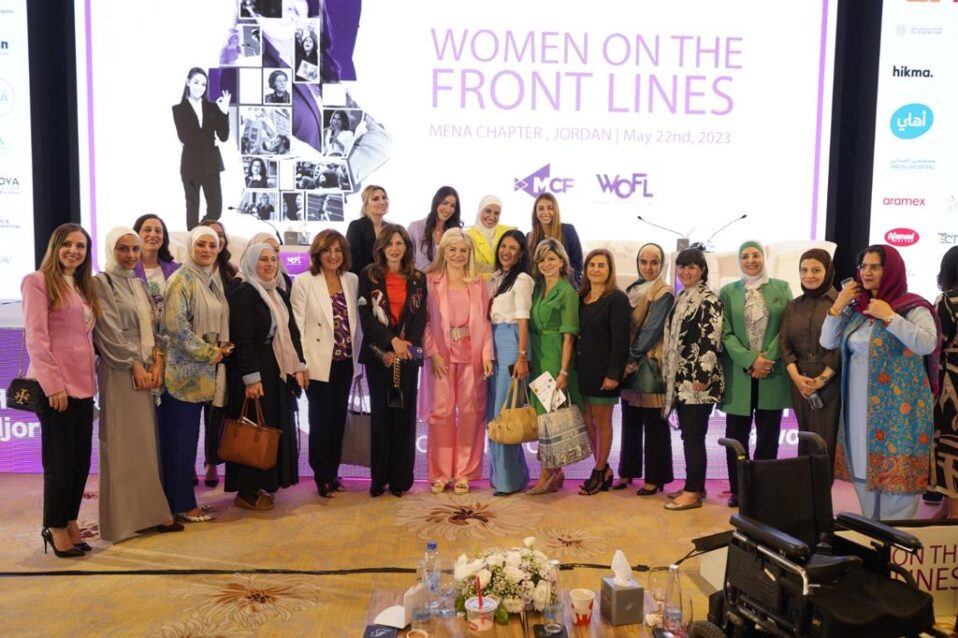Ricardo Karam: The images tell the story of a French citizen of Arab origin, who entered the world of politics and became a minister at the age of thirty-four. She served as the Minister of Human Rights, a challenging role in a time when I believe that immigration is the biggest issue we face today. She imposed herself and decided, after five years and following her defeat in the parliamentary elections, to step away from the world of politics and embark on another journey, which is the realm of humanitarian services. Her world became a world of giving. Before we proceed, I want to mention that Najat, who is here with us today, her mum is in this room. Hello Miss, and a huge thanks goes to you. Your daughter is who she is because of you. You are where you are today. Definitely, it wasn’t an easy path, it was a path full of thorns, and for someone, who is originally from the Arab world to find and to impose herself and to become who you are today, doing politics, was it something you have thought of when you were young? Was it a vocation? Was it in your genes? How can you become eventually a politician? And how can we dream when we have no means to have access to that field and to be on the front lines of that specific field?
- Najat Vallaud-Belkacem: Hi everyone, I’m so sorry not to speak Arabic. I was born in Morocco, so originally, I am from the Arabic world, but actually, I speak Amazigh, Berber language and not Arabic. Then, my second language was French, and then, German, and then, Spanish, and then English. So English, I’m going to try to speak well, but you understand that it’s not my first language. I would like to introduce this session, if you allow me by thanking really May Chidiac because May, I love you, you are such a source of inspiration for us. I think everyone in this room is full of admiration for you. That’s what I wanted to say. To come back to your question, well, when I was young, I think I really did not imagine that one day I could be a politician. It was something like totally crazy for me. As you said, I was born in Morocco, I arrived in France when I was four years with my parents, I graduated in law at school. The only thing that I was dreaming of was being a writer in a house, you know, on the ocean, something like that because I really loved to read and to write, but after that, you know, politics is about something else than really vocation or, you know, what you have been learning at school, and so on. Politics. The only question you should ask yourself when it comes to politics is not did I dream of being president since the age of 13 or even am I the best technician, leader, orator in this neighborhood, in this university. No, I think it’s not the good question to ask yourself. The good question to ask yourself is what does my neighborhood or my university or my country stand to lose if I’m not there to defend it, you know, and to defend it by myself. I became involved in politics in 2002 because the national front so the extreme right in France made it to the second round of the French presidential elections, given my own history as a young girl, who arrived in France at the age of four with my older sister and mother, family that had always strived to avoid causing any problems to be accepted in this country, France. I couldn’t let this country risk falling into the hands of the extreme right, a populist force, whose sole trade was racism towards immigrants and the refusal to accept them as citizens of this nation. So, that was this idea that I could contribute to prevent the dismantling or progress or even contribute to positive change that made me be involved in politics. So, that is not a question of vocation or credential. Why do I say that? Because I have an advice for you, which is that if you ever feel that click within yourself, you know, you have to go and to be vocal. It can be in politics, it can be in NGOs, but if you feel this click that tells you that if you don’t act now, something will disappear that is very important for you in your community, then you should be involved.
- Ricardo Karam: Ricardo Karam: Najat, you reminded me of a Lebanese novelist, a female, a Lebanese lady, Venus Khoury-Ghata. Venus Khoury-Ghata is now, I believe, 85 years old. She is still alive, she lives in Paris, and she had embraced fame all over, and her books were translated into more than 20 languages and the moment she went once to New York, and she saw her books on the vitrine of Barns and Nobles, she told herself: “Come on, you were a little girl coming from Bcharre, a small village in Lebanon, you used to play bare feet, and now, your books are in New York and sold at Barnes and Nobles. Wake up, girl! This is reality!” And she had made it. So, you know, sometimes, you know, you wake up at times, and you wonder, am I dreaming or am I living reality? So, do you think your life was a twist of fate, a struck of luck, or hard work, or all together?
- Najat Vallaud-Belkacem: I think it was all together, you know, because it is a mix of, you know, you have to work because there are so many prejudices and stereotypes against people, who are different, and I was different, you know. The first time I was elected, you know, people were like she’s too young, she’s too foreign, too slim, too something to be elected as the others, and because they had this kind of prejudices against me, I felt that I had to work twice more than the others, you know, so I did a lot of efforts to show them that, you know, I was worth it. So, it’s a part of work, but it’s also a part of chance because, you know, so many things depend on the meetings rencontres que vous faites.
- Ricardo Karam: the encounters.
- Najat Vallaud-Belkacem: the encounters that you do. The fact that on your way, you will find someone, who is going to inspire you, to help you, to give you some advices. That’s why today, as an adult, because I am an adult now, I spend a lot of hours in my life sharing experiences with students, and so on because it is very important to understand the codes of all of these worlds of politics and to help them, you know, better design how they could find their place.
– Ricard Karam: And most importantly, help them to dream. This is what life is about, to dream.
– Najat Vallaud-Belkacem: Dreaming is very important.
– Ricardo Karam: The RJ co-pilot just said that her mum nurtured her since her childhood, and she used to repeat to her that you are half of the world. She just said. Was your mum doing the same? Was she, you know, when feeding you with values, while encouraging you to become the woman you are today, did she ever tell you that you are half of the world, and you will become one day someone important my little girl or did it never happen?
– Najat Vallaud-Belkacem: I think what my mum told me a lot when I was younger, and which was very important for me, two things. The first thing is that she showed me how important it was for women to be independent, you know, not to depend on someone else, you know, financially, and so on. She would have loved to study, and she didn’t because, you know, moral code this time, you know, you were married very young, and then, you did not have the opportunity to study. So, for her, it was very important that her children just succeed at school. And the second thing is that she was constantly telling me, you know, life has more imagination than you, than you do. That’s why, as you saw on the screen, I wrote a book a few years ago, and the title of the book is “life has more imagination than you can have.” Because it’s so true, but you need someone to tell you that, you need someone to tell you that, for instance, when you fail on something, sometimes you fail. I have been failing on some things. It’s a door that closes.
– Ricardo Karam: Others open.
– Najat Vallaud-Belkacem: But this closed door allows the other doors to open because if these doors had been opened, the others would have closed. So, that’s very important to understand that things are never finished really, you have other opportunities to find ways.
– Ricardo Karam: While writing your autobiography, and the title you’ve given to your book, the word “imagination”, does it pertain to the dreams you had, to the mirage that never occurred, to what lies ahead, to what is imagination for you, is it something that is concrete, is it something that youcan really accomplish, is it something tangible, or is it something that flew in the air?
– Najat Vallaud-Belkacem: I think imagination is about creativity, which
means that, I feel that we are, you know, all of us are not artists, but we can live our lives as if we were artists in a sense that, you know, we are here to create something, you know, and we should use every path, even every failure, to create something. Exactly the same as artists do, you know, I guess that the artists that you prefer are artists that have failed, and then because they have failed, you know, there is light inside them because they have learned things from these bad experiences, and there is such an intensity of emission, and so on.
– Ricardo Karam: It’s not failures. It is falls.
– Najat Vallaud-Belkacem: Yes, falls, exactly.
– Ricardo Karam: They encounter falls. Failure is big. It is life failure. We all have falls.
– Najat Vallaud-Belkacem: Exactly, and inside the falls, the light is passing, you understand what I mean? Ok. So, I will say that, as artists, our life is made to be reinvented every day, so having imagination means that whatever happens in your life, you should have some drivers that make you imagine something else, start to gain something else, and so on.
- Ricardo Karam: Self-confidence is a crucial issue and something we build up around the years of experiences, you are someone with self confidence and we can see through your pictures we can see that you are always present and you know how to impose yourself, how did you build up yourself confidence?
- Najat Vallaud-Belkacem: Well actually self confidence is a very important topic, especially for the women because we lack confidence, it was not easy for me in France because the field of politics usually you find people with privilege, people who has been in rich families and have high culture capital so when you don’t have this kind of capital you lack of this self-confidence and you have to learn how to acquire and what is very interesting for me and what tricks is that you can really learn how to acquire self-confidence for instant when I started as a politician I was afraid to not find the good words, I was the spokes person for the presidential candidate Francois Hollande and then for the government so it was very important to me to know how to speak in the media and big meetings and I found that actually I didn’t have the right words during the day but I found the right words during the night when I was sleeping you know I was like you know this kind of Sensation okay because I was like oh I should have saved these and I understood that when I wake up I had to write what I was remembering of my dreams and weather and this word because it was my real voice my intimate voice and by writing this kind of expressions words and so on I loaded my internal Voice to come back and to be with me you know and you know to be my voice you know not to be like available to just try to simulate the others voices but to have my own my own voice this kind of trick that helps you to to be more self-confident.
- Ricardo Karam: What was the most difficult and intimidating moment you went through?
- Najat Vallaud-Belkacem: Actually you know I encountered immediately comments questioning my purpose in politics I encountered attempts to confine me to Narrow categories and accusation of incompetence or illegitimacy and so as every woman I think really but I was not only a woman I was young woman coming from abroad and from a Muslim culture which was a topic so well the important thing for me was to understand that it’s because of this kind of differences that I was attacked but I have faced right of actual if you remember when I first I faced the irrational hatred baseless rumors about my intention my reforms as a minister for women’s rights but also has the Minister for education you have to remember that it was the first time that a woman was minister for education before that’s it was only men who were ministers of education so a lot of attacks I have been for instance portraited portrait like an ayatollah pink smell or Troublemaker in some newspaper from far right from extreme right but you know yeah and not a single debate concerning me escape some degree of fantasy around the idea that I was there to Islamize France yeah you know so my journey was not really easy that’s another lot of things.
- Ricardo Karam: France has a diverse society with multicultural diversity and backgrounds how can the government strike a balance between fostering integration and preserving cultural identity.
- Najat Vallaud-Belkacem: Well I think it’s a question of balance because you know I am strike what’s right to me is the fact that you know in so many societies the politicians just want to polarize society you know you don’t need to pull a rice Society there was Society is enough polarized by itself you know and as a politician you should try to find the good tools and ways to depolarize society and that means find the ways to include people you know the ways for people to meet each other to encounter each other you know and not to live in separate levels and to answer your question I think it’s important to tell people that when they are living in a country even from abroad there are rules to respect and so on and the way and what is important in terms of institution and but at the same time keeping for instance your original language having the capacity for your children to learn it knowing you know what is your original country and it is so important for people to feel well it’s only a question of feeling well you know knowing as a one of our friends you know he said I’m originally from a Algeria and grew up in France for me Algeria is my mother and France my father and it’s true that when you are mixed when you have a mixed culture you you know it’s so uncomfortable to feel that you have to choose between the spirituals and I think that politicians not force you to imagine it’s a question of imagine ways of mixing everything that is diversity of the society.
- Ricardo Karam: When you are in france you feel french and when you are in Morocco you feel that your Moroccan or I don’t know you feel that you are a citizen of the world.
- Najat Vallaud-Belkacem: Now I think yeah people recognize me in the streets actually now people do not bully me I just want to precise something I was talking when I was telling you about all the fights that I had when I was a politician and so on I was talking about the far right you know I am not talking about everyone in France actually I have to say that people in France like me a lot of them like me a lot so I was really lucky, I feel more French I’ve been living you know since I was four years old that’s my long age that’s my that’s the culture I’m living in that’s the country where my own children are born that’s I have like affection kind of affection for Morocco because it’s the country of my ancestors of my family when I see that you know the low is changing for instance there is a family you know about a woman’s rights and so on when it is positively evolving and so proud I’m so happy and when they’re troubles that I am you know worried and so I’m both.
- Ricardo Karam: If you want to qualify your path your life with a sentence with the word which were given to this exciting life.
- Najat Vallaud-Belkacem: No Fatality
- Ricardo Karam : Najat Thank you so much.
Read more: WOFL Jordan 2023 Welcome Notes Mrs. Maha Shair




